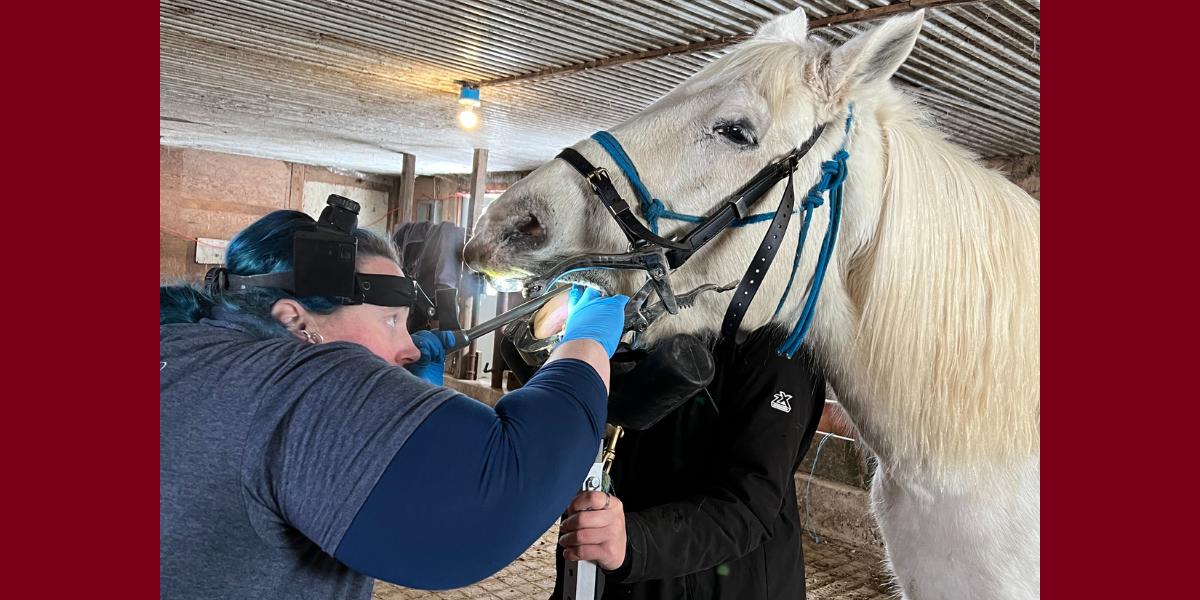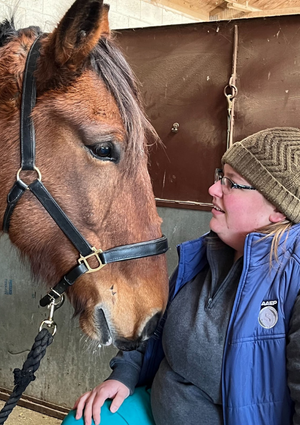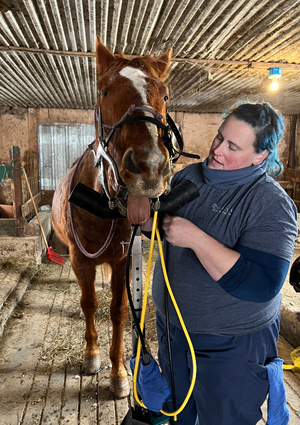On the road
CVM grads start mobile veterinary clinics to meet growing demand for services

CVM grads start mobile veterinary clinics to meet growing demand for services
Dr. Melanie Jackson examines the mouth of an equine patient. Photo courtesy of Melanie Jackson.
College of Veterinary Medicine (CVM) graduates have traded in their caps and gowns for white coats and stethoscopes—putting years of veterinary education and training to use. Career choices today are flexible, especially in this post-pandemic world where non-traditional, remote work options have increased.
Veterinary service preferences, client needs, and provider delivery methods also are rapidly changing to include telemedicine visits, curbside care, and in-home services such as exams, hospice care, or euthanasia. Graduates seeking careers other than in a traditional brick-and-mortar clinic may consider a mobile veterinary career or a hybrid of the two.
While not new, mobile veterinary offerings are gaining ground as demand for veterinary services continues to grow and leaves areas experiencing care shortages. CVM alumnae Melanie Jackson, ’15 DVM, and Lara Stephens-Brown, ’18 DVM, have embraced these trends and both recently started their own mobile veterinary practices.
Jackson, a resident of Grand Rapids, Minn., founded North Star Mobile Veterinary Care in April 2022. Located in the north-central region of the state, Grand Rapids is a rural community with a population of just over 10,000 people. In outstate areas, veterinary services can be hard to come by. Jackson recognized a need for large animal care that offered the convenience of on-farm calls as an alternative to haul-in veterinary care services that required clients to travel long distances with their animals.

“I like being able to travel locally and provide a service that would otherwise be severely limited or unavailable in my area of north central Minnesota,” she says.
Stephens-Brown followed a similar path and started a mobile large animal practice, Northern Lights Veterinary Service, in her hometown of Skandia, Mich. After working in a traditional veterinary service, Stephens-Brown wanted to change course.
“I had always planned to start my own practice, but this ended up being a shove into the deep end a little earlier than anticipated,” she says. “I was in an unsustainable work environment and trapped with a non-compete that prevented me from working anywhere in my county. The only way I could see out and stay in my area was to open my own practice.”
Becoming business owners presented both veterinarians with challenges not covered in the typical veterinary medicine curriculum.
“There is much I did not know—and still don’t fully understand—about running a business and the cost that goes into making sure things are done correctly from an advertising, marketing, and legal standpoint,” Jackson says.
Trained as a veterinarian and not a business owner, the management skills required for the business side of a mobile veterinary practice are less innate than caring for animals and interacting with their owners. But the relatively low start-up costs enabled Jackson to make the dream of starting her own mobile veterinary service a reality.
“Basically, I started the business with my personal vehicle and a stethoscope,” she says.
There is equipment on Jackson’s wishlist. Her practice is not yet equipped with mobile radiology equipment—a relatively steep start-up cost that many mobile veterinary services forgo initially.
Stephens-Brown did choose to invest in an imaging machine. To hold down operating costs, she keeps little inventory on the shelf and orders many of the supplies needed to see clients as appointments are scheduled.
While the format of their businesses is mobile, both Jackson and Stephens-Brown offer similar services to their stationary counterparts.

Providing basic annual wellness exams and herd health care, Jackson treats equine and small ruminant patients such as goats, sheep, and camelids. At this time, Jackson does not offer emergency services outside of regular business hours but certainly assists on occasion as able. In addition to making a referral when animals need diagnostic X-rays or after-hours emergency services, cases requiring anesthesia or surgery are directed to a haul-in clinic for care.
“Haul-in facilities generally have the resources and staff to accommodate such cases more effectively,” she adds.
Currently, Stephens-Brown offers wellness, lameness, and dental exams as well as emergency care for large animals and horses. In addition to digital radiography, she also has ultrasound available.
While able to offer a limited number of appointments for dogs and cats, she will do spinal manipulation therapy on horses and small animals, and she offers in-home euthanasia. She also consults on behavior issues for aggressive dogs but does not provide emergency care for small animals at this time.
Building a client base is a key part of growing and sustaining Jackson and Stephens-Brown’s businesses.
Currently, most of Jackson’s clients are within a 30- to 45-mile radius, but occasionally she may travel as far as 70 to 80 miles. Jackson built her client base primarily through word-of-mouth and referrals through other clients.
Because she still works full time in a small animal clinic and offers large animal mobile services on a part-time basis, she has plenty of clients to keep busy for now. With limited large animal care options in the area and current clients sending new business her way, she anticipates future expansion.
For Stephens-Brown, growing the business happened quite quickly as other veterinary clinics in the area are drowning in business.
“They have had no problem referring people that won’t fit into their schedule or who may be interested in at-home euthanasia for sick pets,” she says.
As current CVM students start the search for their first positions out of vet school, they may consider joining a mobile veterinary service instead of a more traditional practice. Given relatively reasonable start-up costs and the very high demand for veterinary care, especially mobile care in rural areas, it certainly seems like an option worth considering for some graduates.